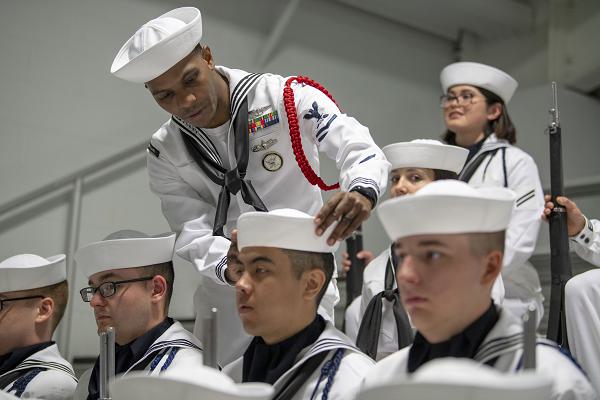
Naval Air Station Great Lakes, Illinois. (May 9, 2024): America’s armed forces are struggling to attract new recruits, and the Navy is determined to do something about it. In this photo by MC2 Christopher M. O'Grady, Aviation Boatswain's Mate (Handling) 2nd Class Lauret Price fixes a recruit's head cover during a recent Recruit Training Command pass in review graduation ceremony. Great Lakes, located near Chicago, is the Navy’s only boot camp that trains more than 40,000 recruits a year.
According to Navy officials’ testimony to Congress this week, the service projects it will miss its recruiting goals by 6,700 recruits this year. Overall, the Navy has achieved seventy percent of its recruiting goals for the first half of this year, lagging the other services who are on target to meet ninety percent of their objectives. The lone bright spot is the Marines who reliably meet their quota regardless of economic conditions.
Currently, the Navy is short 18,000 Sailors needed for operations at sea and an additional 4,000 to do shore-based jobs. Overall, the military services collectively missed their recruiting goals by about 41,000 recruits in 2023.
The Navy has responded aggressively by opening a path for non-high school graduates with demonstrable skills to enlist for the first time. By opening this new path to enlistment, the Navy hopes to expand the pool of applicants while maintaining recruit quality. The Navy announced in January that those without a high school diploma or General Educational Development credential could enlist — if they score a fifty or higher on the Armed Forces Qualification Test. The service projects the change could bring in 2,000 more sailors annually.
The Navy also increased the maximum enlistment age from 39 to 41 and raised the maximum enlistment bonus to $50,000. Additionally, those entering the nuclear field could receive a $75,000 maximum enlistment bonus as of last summer. Navy officials also intend to launch a “Conversation with America” via a series of educational events touting service life and the benefits of sea duty for young people.
All of America’s armed forces have struggled lately due to a strong economy which has resulted in many more options for young people. A smaller eligible population and a general tendency by Generation Z to distrust institutions has exacerbated the situation.
Despite these challenges, America’s military continues be an excellent opportunity for young people to advance their careers while serving their country.


